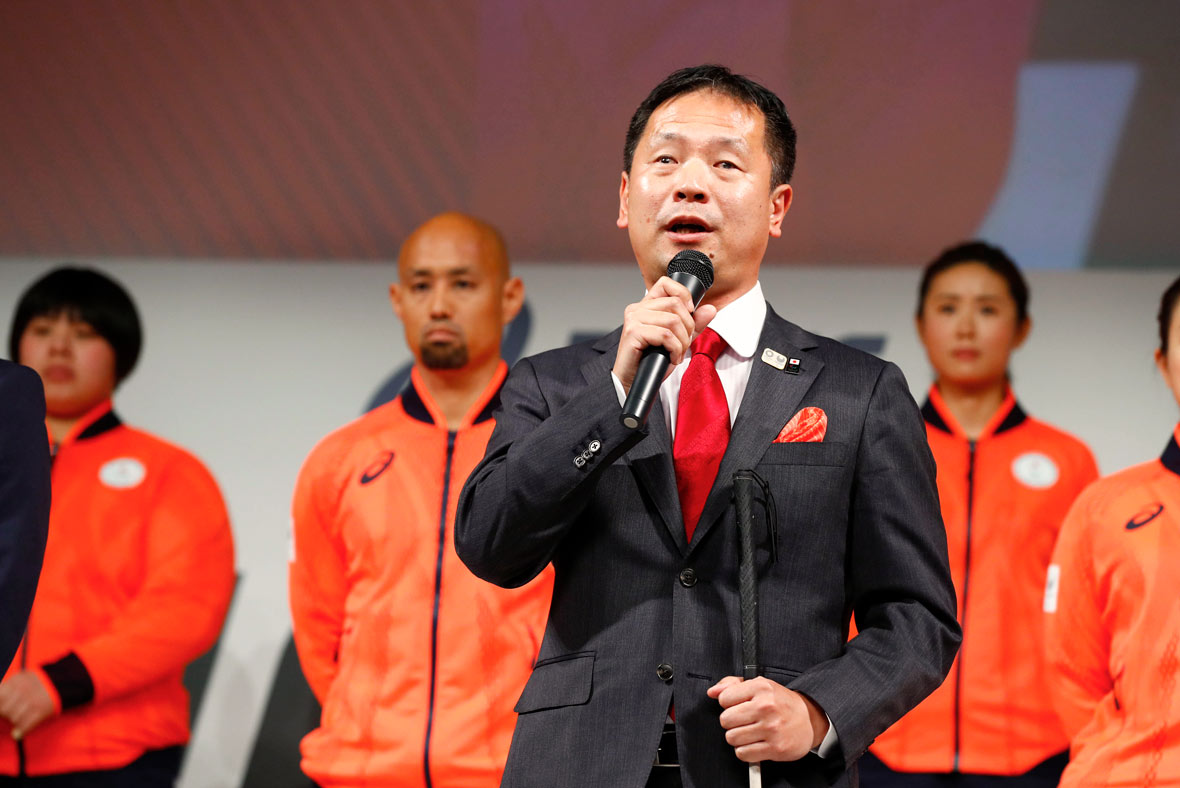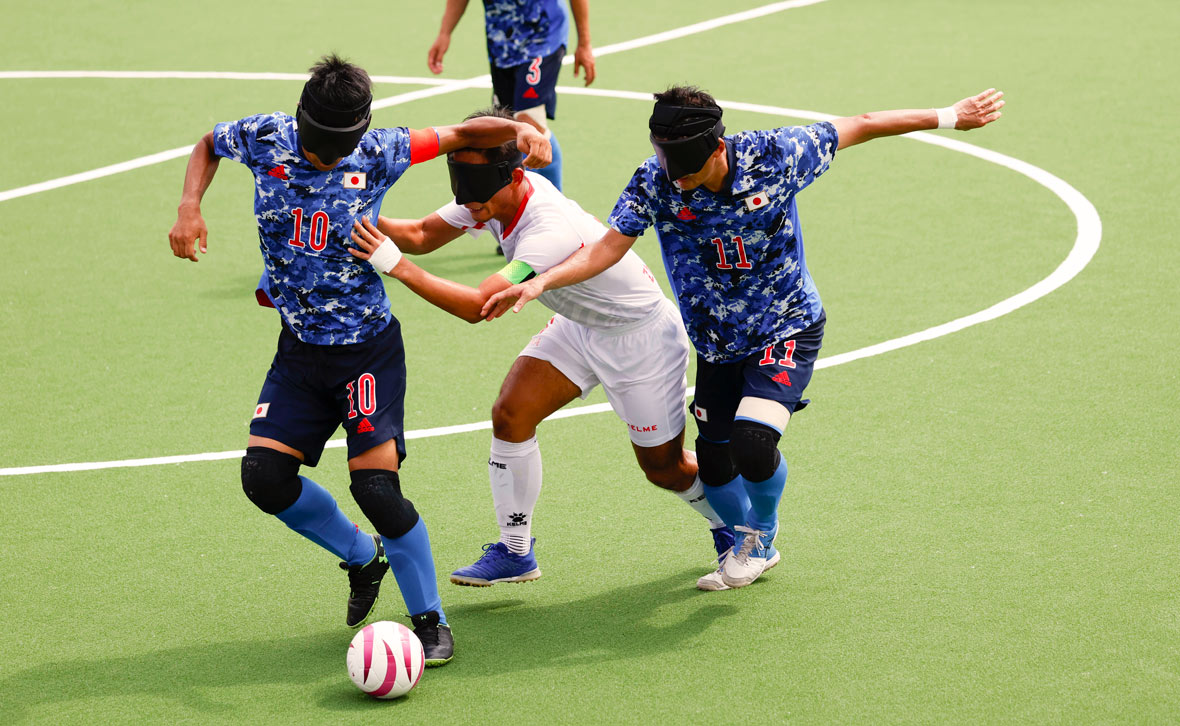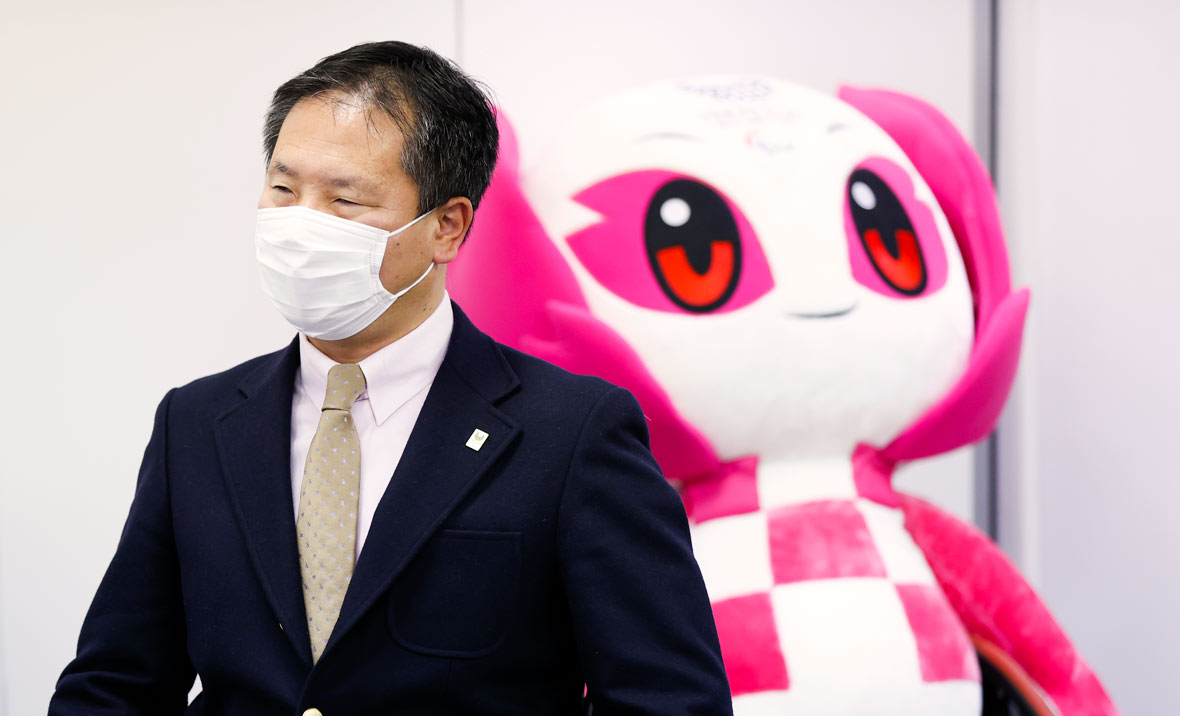SSF: How would you sum up the Tokyo Paralympics, which you helped organize as chair of the JPC?
JUN’ICHI KAWAI: We were forced to alter our original plan in many ways, such as holding most events without spectators. But given the array of challenges posed by the pandemic, I think the fact we were able to hold the Games at all without any major incidents was in itself a notable achievement.
Perhaps more so than people without disabilities, athletes who become handicapped due to an injury or disease are likely to be familiar with and adept at overcoming the various challenges life throws at us. The one-year postponement, for instance, can be seen as a blessing if we think about the outstanding medal performance of our younger para-athletes, who got to practice and train for an additional year at newly built para-sports facilities, like those that opened at the National Training Center in September 2019.

Jun’ichi Kawai speaks during an event announcing the official sportswear for the Japanese delegation at Tokyo 2020.©Photo Kishimoto
SSF: Prior to the start of Tokyo 2020, many people in Japan favored either further delaying or cancelling the Games, but a post-Games Kyodo News poll showed that 62.9% and 69.8% of respondents, respectively, were glad that the Olympics and Paralympics were held. How do you account for this turnaround in public sentiment?
KAWAI: I was struck by the fact that nearly all the athletes who were interviewed said they were grateful to be at the Games. You could tell they really meant it, and I have a hunch that members of the public were touched by these sincere expressions of gratitude.
The silver lining is that the pandemic highlighted how thankful we ought to be for the many aspects of the Games that we would normally have taken for granted. I would consider this to be a positive legacy of the Tokyo Games. A sense of gratitude is something we should always keep in mind in developing future generations of athletes.
At the same time, we shouldn’t overlook the many negative comments that we received, especially on social media. For instance, some 80% of children and their parents had expressed their wish to see the Paralympics in person, but I became the target of a furious online backlash when I announced a program to invite schoolchildren to the Games in partnership with schools. People accused me of unnecessarily exposing youngsters to the risk of infection. Our plan was initially to invite around 1.3 million children to various Paralympic venues, but only about 15,000 actually attended because of the attention given to the small share of people who were critical of the program. The number of kids who came was smaller than we had hoped, but I think it turned out to be a valuable experience for all of them. The fact that they’ll be able to share what they saw and felt with others will prove to be very important going forward. And I’m thankful to the local governments and schools that did send their kids to the Games, in spite of COVID-related uncertainties.
I’m also grateful for the extensive media coverage given to both the various Paralympic events and the participating athletes. This helped to generate great interest among members of the public, who would otherwise have had no way of knowing about the Games because the seats were largely empty. Since Tokyo was selected as the host city in 2013, many new innovations were introduced, such as having people with disabilities serve as commentators and interviewers during broadcasts. I think this allowed many more people to gain a better sense of what it’s truly like to compete as a para-athlete.

Para-swimming gold medalist Keiichi Kimura and wheelchair basketball silver medalist Hiroaki Kozai were among the many para-athletes to be frequently featured in the media following the Tokyo Games.©Photo Kishimoto
SSF: What kind of role do you see the JPC playing going forward?
KAWAI: Our mission, according to the JPC Strategic Plan published in December 2020, is “to support the success of para-athletes aiming for the international level” and “to promote the Paralympic movement.” What this means is that while the work of identifying promising para-athletes, undertaking basic training, and coaching them into world-class Paralympians falls mainly on the athletes themselves, their staff, and the various national para-sports federations, the JPC’s activities are primarily focused on supporting athletes who are ready for international competition and drawing on their success to achieve the goal of the Paralympic movement, which is to overcome barriers and build a more inclusive society.
The drafting of the Strategic Plan was a big step forward for us in enabling the JPC staff to share a roadmap for the future.
SSF: Do you feel that the hosting of the Tokyo Paralympics has led to any tangible changes?
KAWAI: One important achievement was the publication by the University of Tsukuba Press in November 2021 of a handbook titled the Basics of Coaching Athletes with Visual Impairments, for which I served as an editor. It was the first book in Japan on working with the visually impaired that addressed the topic in an exhaustive manner from a specialist’s perspective, and I believe it will be of tremendous help for not only coaches but all school teachers and others in the community working with people who have special needs. There’s a long way to go, but given the vacuum of information on the subject until now, even a small step can make a big difference.

A scene from a five-player blind football match during Tokyo 2020. July 2022 saw the launch of LIGA.i, the first-ever top league of blind football teams in Japan. ©Photo Kishimoto
Some people in the Paralympic community say they’re worried that corporate sponsors will lose interest, now that the Games are over. But this isn’t something we have to leave in the hands of fate. We can do market research to ascertain the benefits companies are looking for in sponsoring a particular para-sport or para-athlete and then present proposals that are in line with their needs. We should come up with projects to be carried out with corporate partners that can help achieve specific social goals, and we should clearly state how much support we’ll need. Presentation skills aren’t enough, moreover. Para-sports federations and athletes are increasingly being called upon to acquire management skills and the knowhow to review and assess the effectiveness of operations. If we can find ways to forge win-win relationships, I’m sure companies can be persuaded to continue sponsoring the Paralympic movement.

Starting from an essentially zero situation, even small steps, Kawai says, can make a big difference in helping build a more inclusive society. ©Photo Kishimoto
SSF: How can you help para-athletes who retire from active competition succeed in their second careers?
KAWAI: The Ministry of Education, Culture, Sports, Science, and Technology has shown great interest in career education, starting from as early as kindergarten. But who knows what jobs are going to be in demand or what kind of society we’ll be living in just ten years down the road? I don’t see much meaning in grooming people for future employment when they’re currently fully engaged in competition. What’s more important is to provide opportunities to gain an awareness of what it is that really makes us happy and what we ultimately want from life. That, for me, should be the basis of any “career education.”
Tokyo 2020 was a major turning point for the para-sports community in Japan, as well as for our country in general, and my job is to communicate the significance of having hosted the event through as many different forums and channels as possible. I believe this is how we can move closer to achieving the goals of positive social change that we set for the Games. The para-athletes who participated in Tokyo 2020 will play the leading role in passing on what they learned to the next generation, and I’ll be fully supporting their efforts by sharing my own communication insights and experiences.
Translated from an interview conducted in Japanese on December 16, 2021.




